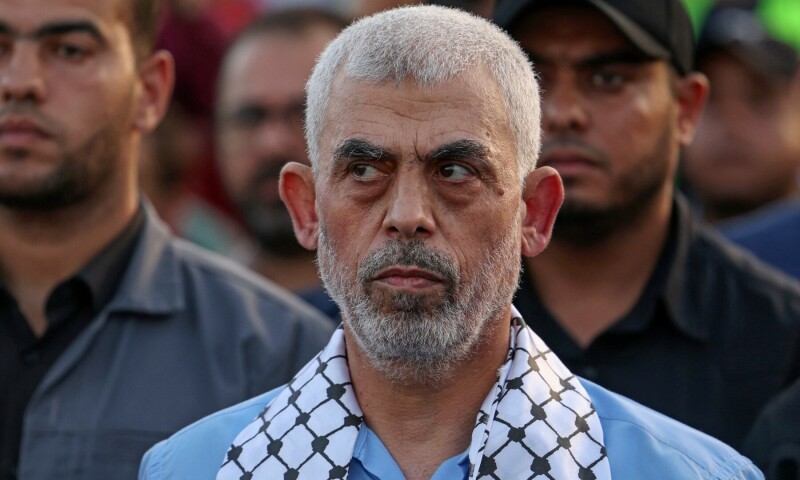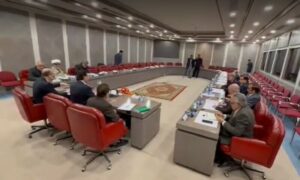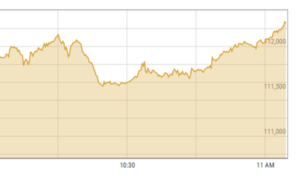His understanding of the everyday hardships and brutal realities in Gaza was well-received by Gazans and made people feel at ease.
Hamas leader Yahya Sinwar remained unambiguous about the October 7 attacks a year ago, people in contact with him said, despite it triggering a devastating Israeli invasion that has killed tens of thousands of Palestinians, laid waste to Gaza and rained destruction on ally Hezbollah.
On Thursday, the Israeli military claimed that it had killed Sinwar, 62, architect of the Hamas cross-border raids that became the deadliest day in Israel’s history.
For Sinwar, armed struggle remained the only way to force the creation of a Palestinian nation, four Palestinian officials and two sources from governments in the Middle East said, speaking in weeks leading up to the Oct 7 anniversary.
The Oct 7 attacks killed 1,200 people, mainly civilians, and captured 250 hostages, according to Israeli tallies, in the deadliest day for Jews since the Holocaust.
Israel responded by launching a massive devastating offensive, killing 42,400 people and displacing 1.9 million, according to Palestinian health authorities and UN figures.
Now the conflict has spread to Lebanon, with Israel heavily degrading Iranian-backed Hezbollah, including killing most of its leadership. Hamas patron Tehran is at risk of being pulled into open war with Israel.
Sinwar drew Iran and its entire “Axis of Resistance” — comprising Hezbollah, Yemen’s Houthis and Iraqi militias — into conflict with Israel, said Hassan Hassan, an author and researcher.
“We’re seeing now the ripple effects of Oct 7. Sinwar’s gamble didn’t work,” Hassan said, suggesting that the Axis of Resistance may never recover.
“What Israel did to Hezbollah in two weeks is almost equal to a whole year of degrading Hamas in Gaza. With Hezbollah, three layers of leadership have been eliminated, its military command has been decimated, and its important leader Hassan Nasrallah has been assassinated,” Hassan added.
Sinwar’s grip on Hamas remained unwavering, despite some signs of dissent among Gazans.
He was chosen as the movement’s overall leader after his predecessor Ismail Haniyeh was killed in July by a suspected Israeli strike during a visit to Tehran. Israel has not confirmed its involvement in the strike.
Operating from the shadows of a network of labyrinthine tunnels under Gaza, two Israeli sources said Sinwar and his brother, also a top commander, had appeared to have survived Israeli airstrikes, which have reportedly killed his deputy Mohammed Deif and other senior leaders.
Dubbed “The Face of Evil” by Israel, Sinwar operated in secrecy, moving constantly and using trusted messengers for non-digital communication, according to three Hamas officials and one regional official. He was not seen in public since Oct 7, 2023.
Over months of failed ceasefire talks, led by Qatar and Egypt, that focused on swapping prisoners for hostages, Sinwar was the sole decision-maker, three Hamas sources said. Negotiators would wait for days for responses filtered through a secretive chain of messengers.
Hamas and Israel did not respond to requests for comment. Sinwar’s high tolerance for bearing hardship, both for himself and for the Palestinian people, in the name of a cause, was apparent when he helped negotiate the 2011 exchange of 1,027 prisoners, himself included, for one kidnapped Israeli soldier held in Gaza. The kidnapping by Hamas had led to an Israeli assault on the coastal enclave and thousands of Palestinian deaths.
Half a dozen people who knew Sinwar told Reuters that his resolve was shaped by an impoverished childhood in Gaza’s refugee camps and a brutal 22 years in Israeli custody, including a period in Ashkelon, the town his parents called home before fleeing after the 1948 Arab-Israeli war.
The question of hostages and prisoner swaps was deeply personal for Sinwar, said all the sources, who requested anonymity to speak freely about sensitive matters. He had vowed to free all Palestinian prisoners held in Israel.
Sinwar became a member of Hamas soon after its founding in the 1980s, adopting the group’s ideology, which seeks to establish an Islamic state in historic Palestine and opposes Israel’s existence.
The ideology views Israel not only as a political rival but as an occupying force on Muslim land. Seen in this light, hardships and suffering were often interpreted by him and his followers as part of a larger belief in sacrifice, experts on Islamist movements say.
“What lies behind his resolve is tenacity of ideology, tenacity of goal. He’s ascetic and satisfied with little,” said one senior Hamas official who requested anonymity.
From sackcloth to leader
Before the conflict, Sinwar would sometimes tell of his early life in Gaza during decades of Israeli occupation, once saying his mother made clothes from empty UN food-aid sacks, according to Gaza resident Wissam Ibrahim, who has met him.
In a semi-autobiographical novel written in prison, Sinwar described scenes of troops bulldozing Palestinian houses, “like a monster crushing its prey’s bones”, before Israel withdrew from Gaza in 2005.
An enforcer tasked with punishing Palestinians suspected of informing Israel, Sinwar then made his name as a prison leader, emerging as a street hero from a 22-year Israeli sentence for allegedly masterminding the abduction and killing of two Israeli soldiers and four Palestinians. He then quickly rose to the top of the Hamas ranks.
His understanding of the everyday hardships and brutal realities in Gaza was well-received by Gazans and made people feel at ease, four journalists and three Hamas officials said, despite his fearsome reputation and explosive anger.
Sinwar was regarded by Arab and Palestinian officials as the architect of Hamas’ strategy and military capabilities, bolstered by his strong ties with Iran, which he visited in 2012.
Before orchestrating the Oct 7 raids, Sinwar made no secret of his desire to strike his enemy hard.
In a speech the year before, he vowed to send a flood of fighters and rockets to Israel, hinting at a war that would either unite the world to establish a Palestinian state on land Israel occupied in 1967 or leave the Jewish nation isolated on the global stage.
By the time of the speech, Sinwar and Deif had already hatched secret plans for the assault. They were even running training drills in public that simulated such an attack.
His goals have not been fulfilled. While the issue is once again at the top of the global agenda, the prospect of a Palestinian nation is as distant as ever.
Israeli Prime Minister Benjamin Netanyahu has categorically rejected a post-conflict plan for Gaza that would include a firm timeline for the establishment of a Palestinian state.
‘Head harder than a rock’
Sinwar was arrested in 1988 and sentenced to four life sentences, accused of orchestrating the abduction and murder of two Israeli soldiers and four suspected Palestinian informants.
Nabih Awadah, a former Lebanese Communist militant who was imprisoned with Sinwar in Ashkelon between 1991-95, said the Hamas leader viewed the 1993 Oslo peace accords between Israel and the Palestinian Authority as “disastrous” and a ruse by Israel, which he said would only relinquish Palestinian land “by force, not by negotiations”.
Calling him “willful and dogmatic”, Awadah said Sinwar would light up with joy whenever he heard of attacks against Israelis by Hamas or Lebanon’s Hezbollah group. For him, military confrontation was the only path “to liberating Palestine” from Israeli occupation.
Awadah said Sinwar was an “influential model to all prisoners, even those who were not Islamists or religious”. Michael Koubi, a former official with Israel’s Shin Bet security agency who interrogated Sinwar for 180 hours in prison, said Sinwar clearly stood out for his ability to intimidate and command.
Koubi once asked him, then aged 28 or 29, why he was not already married. “He told me Hamas is my wife, Hamas is my child. Hamas for me is everything.” Sinwar married after his release from prison in 2011 and has three children.
In jail, he continued to pursue Palestinian spies, Awadah said, echoing reports from Shin Bet interrogators.
His sharp instincts and caution allowed him to identify and expose Shin Bet informants infiltrating the prison, Awadah said.
He said Sinwar’s leadership was pivotal during a hunger strike in 1992, in which he led over 1,000 prisoners to survive solely on water and salt. Sinwar negotiated with prison authorities and refused to settle for partial concessions. He also used his time in prison to learn fluent Hebrew.
Awadah said Sinwar frequently recalled that Ashkelon, where they were imprisoned together, was his family’s ancestral hometown.
When playing table tennis in the courtyard of Ashkelon jail, in present-day Israel, Sinwar would often play barefoot, saying he wanted his feet to touch the land of Palestine.
“Sinwar often told us: ‘I’m not in prison; I’m on my land. I am free here, in my country.’”
Header image: Head of the political wing of the Palestinian Hamas movement in the Gaza Strip Yahya Sinwar attends a rally in support of Jerusalem’s al-Aqsa mosque in Gaza City on October 1, 2022. — AFP







